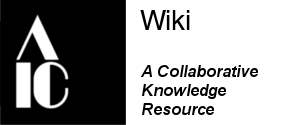Choosing a Specialty
Navigate back to Emerging Conservation Professionals > Getting Started in Your Career > Choosing a Specialty
Introduction[edit | edit source]
Because conservation is a multi-disciplinary field, it is beneficial to gain as much experience as possible during the emerging years. Specializing before graduate education is not necessary and most North American training programs provide experience in the different specialties. To learn more about the various aspects of conservation, visit other conservation labs, talk to conservators, conservation scientists, preventive conservators, collection managers, etc., about their work. There are also reading materials available that discuss different specialties and special ethical considerations for each. Education and Training Committee Recommended Reading Lists Wiki page on Materials and Treatment.
Considerations[edit | edit source]
Your conservation specialty is a highly personal choice, and it takes some conservation students significant time and research to decide what is the best path for them. When choosing a specialty, it is important to speak to established professionals within that area. Try to gain better insight into the specialty as a professional group to determine whether or not you would be a valuable addition to it. You should also be aware of the diversity of materials that each specialty is responsible for and consider what materials excite you the most. It is also important to think about where you hope to work after graduate school, as there are more institutional jobs for certain specialties than others. If you are interested in private practice, that may not weigh as heavily in your decision.
Resources[edit | edit source]
Webinar on Conservation Science[edit | edit source]
ECPN hosted the webinar Pathways into Conservation Science to learn more about the different ways one can train to become a conservation scientist. The program featured three speakers: Dr. Tom Learner, Head of Science at the Getty Conservation Institute; Dr. Gregory Smith, the Otto N. Frenzel III Senior Conservation Scientist at the Indianapolis Museum of Art; and Dr. Robyn Hodgkins, the Charles E. Culpeper Fellow in the Scientific Research Department at the National Gallery of Art. The presenters shared their own diverse training experiences, touching on the history of education in conservation science and the current pathways into the field. ECPN hopes that the webinar will provide guidance to individuals considering careers in conservation science, current students and post-doctorates entering the field, as well as inform emerging conservators. (April 22, 2016)
Webinar on Preventive Conservation[edit | edit source]
Preventive conservation is an integral part of many cultural heritage jobs, encompassing any actions meant to minimize the deterioration of collections. But what does this look like in practice, exactly? And how is this role addressed in conservation training? This webinar featured an introduction to the concept of preventive conservation and highlighted potential career paths into this vital specialization.
ECPN Specialty Group Interview Series[edit | edit source]
A series of Specialty Group Interviews have been conducted by ECPN to promote awareness of niche conservation specializations. This series premiered in 2016 with a focus on East Asian art conservation. Since then, installments have continued with AIC's Electronic Media Group (EMG), Wooden Artifact Group (WAG), Libraries and Archives, Photographic Materials Group (PMG), and Architecture Specialty Group (ASG). Each series attempts to represent a range of voices, including perspectives from emerging professionals and seasoned practitioners with varied training pathways. Some pathways included traditional training with one of the Association of North American Graduate Programs in Conservation (ANAGPIC) academic institutions. Others pathways included apprenticeships, conservation education at international universities, and training in allied fields at locations such as the UCLA Moving Image Archive Studies Program and North Bennet Street School bookbinding program. The transcripts do not reflect the opinions of AIC, the graduate programs, or the cultural heritage organizations that are discussed.
| Specialty | Interview | Date |
|---|---|---|
| East Asian Art | Sara Ribbans | July 10, 2016 |
| Yi-Hsia Hsiao | April 2, 2017 | |
| Hsin-Chen Tsai | May 9, 2017 | |
| Grace Jan (Part I) | November 1, 2017 | |
| Grace Jan (Part II) | November 1, 2017 | |
| Electronic Media | Nick Kaplan | October 9, 2017 |
| Alexandra Nichols | October 20, 2017 | |
| Yasmin Dessem | November 8, 2017 | |
| Brian Castriota | November 29, 2017 | |
| Christine Frohnert | December 11, 2017 | |
| Wooden Artifacts | Caite Sofield | June 5, 2018 |
| Paige Schmidt | October 24, 2018 | |
| Harry DeBauche | November 5, 2018 | |
| Karen Bishop | January 7, 2019 | |
| Libraries & Archives | Lyudmyla Bua | August 14, 2019 |
| Henry Hebert | September 11, 2019 | |
| Laura McNulty | November 6, 2019 | |
| Morgan Adams | December 11, 2019 | |
| Photographic Materials | Courtney Helion | January 8, 2020 |
| Colette Hardman-Peavy | February 12, 2020 | |
| Amber Kehoe | March 12, 2020 | |
| Bryanna Knotts | May 13, 2020 | |
| Architecture | Dona Yu | June 10, 2020 |
| Lucy Midelfort | July 14, 2020 | |
| Caroline Dickensheets | August 13, 2020 | |
| Gilda Gross | September 9, 2020 | |
| Sarah Holder | November 11, 2020 | |
| Textiles | Annabelle Camp | November 15, 2021 |
| Heather Hodge | November 30, 2021 | |
| Kris Cnossen | December 13, 2021 | |
| Kaelyn Garcia | January 4, 2021 |
ECPN Specialty Group Liaison Highlights[edit | edit source]
Similarly, ECPN Outreach Officers also completed a series highlighting each ECPN Specialty Group Liaison throughout the 2018-2020 terms. The interview series can be found on the ECPN Liaison Network page
